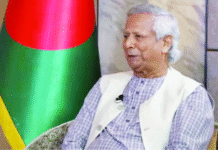Prime Minister Sheikh Hasina’s move to set up an all-party polls-time government has triggered a constitutional debate over the resignation of her ministers for paving the way for forming an interim administration.
The government announcement that the premier will decide on the ministers’ resignation sparked the controversy, as there is no constitutional provision for the premier to determine the fate of a minister, say some legal experts.
The office of a minister other than the prime minister shall become vacant “if he resigns from office by placing his resignation in the hands of the prime minister for submission to the president,” according to Article 58(1) (a) of the constitution.
All 52 ministers and state ministers completed the resignation process yesterday, and the premier would decide on their resignation, said Cabinet Secretary Mosharraf Hossain Bhuiyan.
If the premier doesn’t accept the resignation of any minister, he or she will continue holding the portfolio. “The other resignation letters will be sent to the president for the next course of action. The whole process will be completed soon,” Mosharraf said in a press briefing after a cabinet meeting.
The interim cabinet will have some new members, he said.
The resignation process started on Thursday when at least 20 cabinet members, including four senior ministers, resigned in response to the premier’s call.
Those who had stepped down as ministers earlier were also present at yesterday’s cabinet meeting.
Meanwhile, talking to reporters at the Secretariat, Information Minister Hasanul Haq Inu claimed, “there is no bar for a minister to continuing his office until the resignation letters are accepted.”
However, no date was mentioned in any of the resignation letters submitted to the prime minister, said sources in the Cabinet Division.
Ministers and state ministers hand over their resignations to Prime Minister Sheikh Hasina at Bangladesh Secretariat yesterday to pave the way for formation of an all-party government to oversee the upcoming parliamentary election. Photo: BSS
Both the information minister and the cabinet secretary said the ministers’ resignation will take effect the day the premier accepts those.
Some constitutional experts, however, don’t agree with the explanation and the procedure.
Citing constitutional provisions, they said, in this case, the constitution makes no mention of any requirement of acceptance either by the premier or the president.
They say this debate will add fuel to the ongoing political stalemate over a polls-time government.
The BNP-led opposition has already rejected the premier’s proposal for the all-party polls-time government, and it continues to stage agitation for installation of a non-party election-time government.
“The premier can accept or reject the resignation letter of any employee of the prime minister’s office, but not someone who holds the constitutional office of a minister,” said jurist Shahdeen Malik.
Advocate Sultana Kamal, who stepped down as adviser to the caretaker government in December 2006, said there is no provision in the constitution for acceptance of a minister’s resignation by the prime minister.
Khurshid Alam Khan, editor of Dhaka Law Report, said the offices of the ministers fell vacant the moment they handed over resignation letters to the premier for submission to the president.
Once they step down, they cannot hold the offices or enjoy any state facilities, said Khurshid, also a Supreme Court lawyer.
Leaders of Jatiyatabadi Ainjibi Forum, a forum of pro-BNP lawyers, joined the debate and claimed positions of ministers, who already tendered resignation to the premier, became vacant automatically according to the constitution.
It is illegal, on their part, to hold offices as ministers and enjoy state facilities after submitting resignation letters, AM Mahbub Uddin Khokon, secretary general of the forum, said at a press conference at the Supreme Court Bar Association.
There was a constitutional debate in April last year, as Hasina refused to accept the resignation of then Railway Minister Suranjit Sengupta following the “Railway-gate scandal”. Suranjit was made a minister without portfolio.
At that time, The Daily Star talked to some constitutional experts for their opinion on the issue.
Eminent jurists barrister Rafique-Ul Huq, Dr M Zahir, who died a few months back, and former attorney general Hassan Arif rejected the premier’s claim that a minister holds the portfolio until the premier accepts the resignation letter and the president signs it.
“Is a minister a service holder that his resignation has to be accepted? If a minister resigns, it takes effect immediately,” said Rafique-Ul Huq.
At yesterday’s press briefing, when reporters asked the cabinet secretary whether a minister’s post falls vacant once he or she submits resignation letter to the premier, he said that he was not there to explain the constitution.
Source: The Daily Star












Welcome to Hirok Rajar Deshe!
The arbitrary and capricious thoughts and actions of the PM has made the constitution a party manifesto of the ruling party. As per the present constitution the PM, according to Dr. Akbar Ali Khan, is much, much more powerful and autocratic (though not that benevolent) than the Mughal emperors. The root cause of the PM’s arbitrary and autocratic decisions have made the situation so critical that it now stands beyond repair. The world body, especially the hearing in the US congress, has made it clear that the imminent danger of international sanctions against Bangladesh is the result of our PM’s illogically stubborn stand against all sane and wise quarters of the country. It’s nothing but our misfortune that we voted for such a leader who can trample every reason upon her whims. God save us!